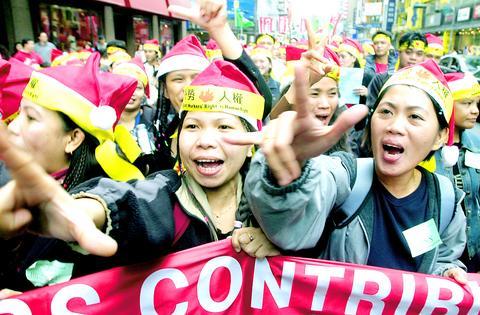Foreign migrant workers took to the streets of Taipei yesterday to fight for better treatment from the government, their employers and employment agencies.
"The Council of Labor Affairs [CLA] has made many promises regarding our basic rights for many years, but has yet to deliver on its promises," said Ellen Panaligan, a Filipino domestic helper who has been working in Taipei for two years.
About 600 Thai, Vietnamese, Indonesian and Filipino migrants along with representatives from several Christian groups and labor unions gathered at the 228 Peace Park and marched toward Taipei Railway Station.

PHOTO: SEAN CHAO, TAIPEI TIMES
"There are four main requests we are petitioning for today," said Reverend Peter O'Neil, director of the Hope Workers' Center in Taoyuan County.
"The first is asking the CLA to re-include foreign workers under the protection of the Labor Standard Law (
The Hope Workers' Center was founded to assist needy foreign migrant workers in Taiwan. It helps more than 70,000 foreign workers a year.
According to O'Neil, in 1998 the CLA included foreign migrant workers in the Labor Standard Law, which aims to protect the basic rights of employees. For instance, the law specifies that the total number of working hours shall not exceed 48 per week, while overtime hours have to be strictly recorded and paid by employers.
"However, after foreign workers had been included in the law, employment agencies and employers started to file complaints about the hassle of keeping track of overtime hours and asked the CLA to exclude foreign workers from the law. As a result, in January 1999, foreign workers were once again deprived of their rights. Right now, there is no law to protect them at all." O'Neil said.
O'Neil also pointed out that many of the migrant workers that call his center for help have been overworked or physically abused by their employers.
"Many migrant workers work 16 to 18 hours a day and can't get overtime pay. Furthermore, many workers are not given any days off each week. Some female domestic helpers are even raped or physically abused by their employers. These workers are not only victims of the Taiwanese legal system but also victims of physical and sexual abuse," O'Neil said.
Panaligan participated in the protest in part to fight for the fair treatment of female domestic workers.
"My employer treats me very well. However, two Indonesian domestic workers in my building have been sexually abused by their employers. One has already asked for help from a counseling center that assists foreign workers, while the other dares not to say a word to the authorities because she is afraid of being repatriated and losing her job," Panaligan said.
O'Neil also pointed out that criminal cases against employers who have abused migrant workers are too time-consuming.
"We have a case where a female domestic worker has been staying in our shelter for over two years. She is almost blind now as a result of being physically abused and raped by her employer. Her employer recently received an eight-year prison sentence but has filed an appeal, which means the case is still open. It is not uncommon that cases against abusive employers drag on for years," O'Neil said.

MORE VISITORS: The Tourism Administration said that it is seeing positive prospects in its efforts to expand the tourism market in North America and Europe Taiwan has been ranked as the cheapest place in the world to travel to this year, based on a list recommended by NerdWallet. The San Francisco-based personal finance company said that Taiwan topped the list of 16 nations it chose for budget travelers because US tourists do not need visas and travelers can easily have a good meal for less than US$10. A bus ride in Taipei costs just under US$0.50, while subway rides start at US$0.60, the firm said, adding that public transportation in Taiwan is easy to navigate. The firm also called Taiwan a “food lover’s paradise,” citing inexpensive breakfast stalls

US PUBLICATION: The results indicated a change in attitude after a 2023 survey showed 55 percent supported full-scale war to achieve unification, the report said More than half of Chinese were against the use of force to unify with Taiwan under any circumstances, a survey conducted by the Atlanta, Georgia-based Carter Center and Emory University found. The survey results, which were released on Wednesday in a report titled “Sovereignty, Security, & US-China Relations: Chinese Public Opinion,” showed that 55.1 percent of respondents agreed or somewhat agreed that “the Taiwan problem should not be resolved using force under any circumstances,” while 24.5 percent “strongly” or “somewhat” disagreed with the statement. The results indicated a change in attitude after a survey published in “Assessing Public Support for (Non)Peaceful Unification

Four former Hong Kong opposition lawmakers jailed in the territory’s largest national security case were released yesterday after more than four years in prison, the first among dozens convicted last year to regain their freedom. Former legislators Claudia Mo (毛孟靜), Jeremy Tam (譚文豪), Kwok Ka-ki (郭家麒) and Gary Fan (范國威) were part of a group of 47 public figures — including some of Hong Kong’s best-known democracy advocates — who were charged with subversion in 2021 for holding an informal primary election. The case fell under a National Security Law imposed on the territory by Beijng, and drew international condemnation and warnings

The CIA has a message for Chinese government officials worried about their place in Chinese President Xi Jinping’s (習近平) government: Come work with us. The agency released two Mandarin-language videos on social media on Thursday inviting disgruntled officials to contact the CIA. The recruitment videos posted on YouTube and X racked up more than 5 million views combined in their first day. The outreach comes as CIA Director John Ratcliffe has vowed to boost the agency’s use of intelligence from human sources and its focus on China, which has recently targeted US officials with its own espionage operations. The videos are “aimed at